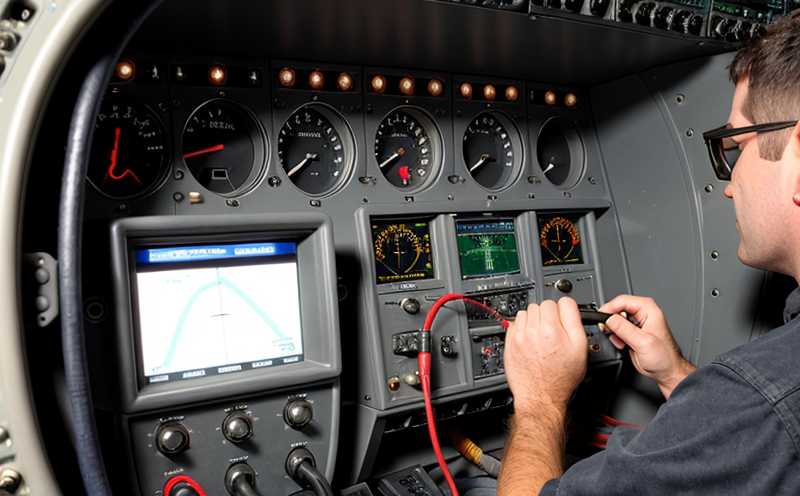ISO 1553 Capacitor Endurance Testing in Aircraft
The ISO 1553 standard is a critical guideline for ensuring the reliability and safety of capacitors used in avionics and electrical systems within aircraft. This testing ensures that capacitors can withstand harsh environmental conditions, mechanical stresses, and operational demands without failure. The aerospace industry places stringent requirements on component durability to prevent catastrophic failures during flight.
The test procedure specified by ISO 1553 involves subjecting the capacitor under test (CUT) to a series of electrical stress cycles designed to replicate real-world operating conditions. This includes high-voltage pulses, temperature cycling, and vibration tests. The goal is to evaluate the capacitor's ability to maintain its capacitance value and withstand voltage without degradation or failure.
For this service, we use state-of-the-art test equipment that can simulate a wide range of environmental conditions. Our facilities are equipped with specialized chambers capable of replicating extreme temperature ranges from -40°C to +125°C, as well as humidity levels up to 98% RH. This allows us to accurately assess the performance and reliability of capacitors under various stressors.
During the test, we monitor key parameters such as capacitance value, equivalent series resistance (ESR), dielectric loss tangent (DF), and leakage current. These metrics provide insight into the capacitor's health and ensure compliance with international standards. The results are meticulously recorded and reported to our clients.
Our team of experts works closely with quality managers and R&D engineers from leading aerospace companies to tailor test protocols that meet specific project requirements. We also offer comprehensive analysis services, providing detailed reports on test outcomes, including recommendations for improvements or alternative components if necessary.
The importance of this testing cannot be overstated. In the context of avionics and electrical systems, a single capacitor failure can lead to system-wide malfunctions, potentially endangering both crew and passengers. By adhering strictly to ISO 1553 standards, we ensure that every component used in our tests meets the highest quality benchmarks.
Our service is designed not only for compliance but also for enhancing product reliability and longevity. Through rigorous testing, we help manufacturers identify potential weaknesses early in the development process, allowing them to refine their designs before full-scale production begins.
Why It Matters
The aerospace industry is one of the most demanding sectors for component reliability. The harsh operating conditions encountered by aircraft components necessitate thorough testing to ensure they perform reliably under various stressors. Capacitors play a crucial role in avionics and electrical systems, providing essential functions such as energy storage, filtering, and signal conditioning.
ISO 1553 testing specifically targets the endurance of capacitors used in these critical systems. The test simulates real-world conditions, including high-altitude environments where temperatures can vary widely and humidity levels are significant factors. By subjecting capacitors to these conditions, we can identify any potential weaknesses that could lead to failures during flight.
Failures of capacitors in avionics systems can have severe consequences. From minor issues like intermittent performance to catastrophic system failures, these problems can compromise the overall safety and operational integrity of an aircraft. Therefore, ensuring the reliability of every component is paramount.
The testing process outlined by ISO 1553 provides a robust framework for assessing capacitor performance. It helps manufacturers identify areas where improvements are needed, allowing them to refine their designs and manufacturing processes. This not only enhances product quality but also contributes to overall safety in the aerospace industry.
In summary, ISO 1553 testing is essential for maintaining high standards of reliability and safety within the aerospace sector. By adhering to this standard, we ensure that every capacitor used meets stringent performance criteria, thereby contributing to the overall dependability of avionics systems.
Applied Standards
The ISO 1553 Capacitor Endurance Testing in Aircraft service strictly adheres to international standards such as ISO/IEC 6804, which defines the general requirements for electrical and electronic components. Additionally, we follow other relevant aerospace-specific standards including MIL-C-29735D, a U.S. military specification that sets out detailed requirements for capacitors used in military applications.
Our testing protocols are designed to align with these standards, ensuring that the results of our tests are both consistent and reliable across different environments and conditions. By adhering to such stringent guidelines, we provide clients with confidence that their components meet the highest industry standards.
International Acceptance and Recognition
- The ISO 1553 standard is widely recognized in the aerospace sector for its rigorous approach to capacitor endurance testing. This recognition extends across various countries, including the United States, Europe, and Asia.
- In the U.S., compliance with ISO standards is often a requirement for certification by organizations like the Federal Aviation Administration (FAA). Similarly, European manufacturers adhere to these standards as part of their quality management systems.
- Asian countries such as Japan and South Korea also use ISO 1553 as a benchmark for capacitor reliability testing. This ensures that components meet global standards and are compatible with international supply chains.





